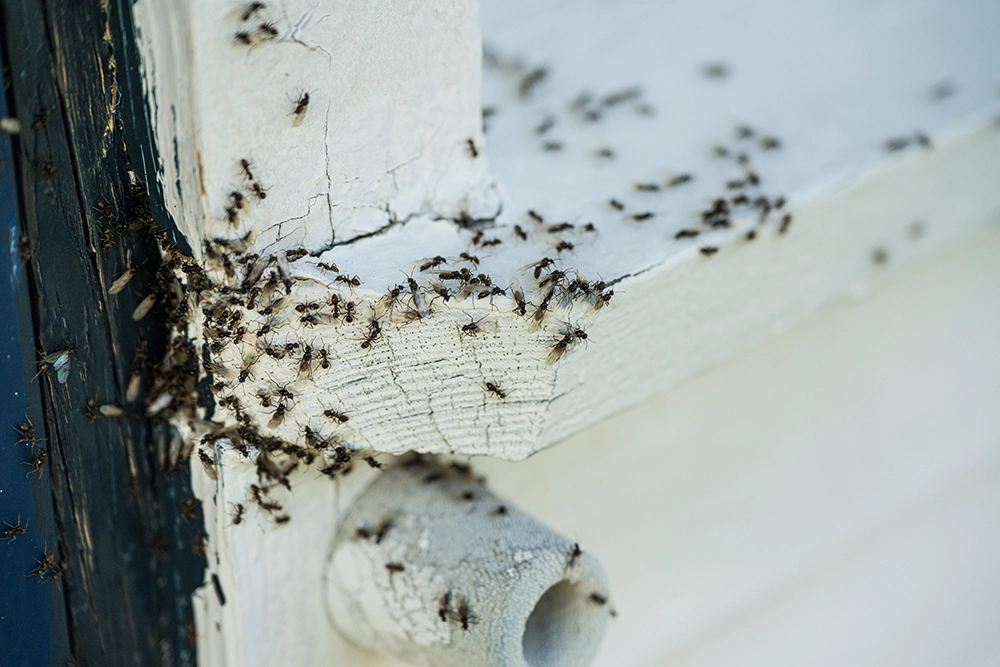Ants are one of the most common household pests, often appearing in kitchens, bathrooms, and other areas in search of food and water. While professional pest control is the most reliable long-term solution, there are several natural and eco-friendly remedies that can help reduce ant activity.
Keep in mind that these natural methods often only offer temporary relief. Ants are resourceful and can quickly find new routes back inside, but these remedies are a good first line of defense before calling in the experts.
Home Remedies to Repel and Control Ants
1. Vinegar Spray
A vinegar and water mixture is one of the easiest DIY ant deterrents. Combine equal parts of white vinegar and water in a spray bottle, then apply it along baseboards, countertops, and ant trails. The strong scent disrupts the pheromone trails that ants rely on to navigate, discouraging them from returning.
2. Fresh Lemon Juice
Lemon juice works similarly by interfering with ant scent trails. Apply freshly squeezed lemon juice around doorways, windowsills, and cracks. You can also dilute it with water for a natural citrus spray that leaves a pleasant smell, while deterring ants.
3. Baking Soda and Sugar
Mix equal amounts of baking soda and sugar, then place small portions of the mixture in shallow containers along ant paths. The sugar attracts the ants, while the baking soda disrupts their digestive system once consumed, which reduces the colony over time.
4. Diatomaceous Earth
Food-grade diatomaceous earth (DE) is a non-toxic powder that dehydrates ants upon contact. Lightly dust it around baseboards, behind appliances, and near entry points. Always use food-grade DE, which is suitable for people and pets.
5. Essential Oil Spray
Essential oils such as peppermint, tea tree, and eucalyptus have strong aromas that repel ants naturally. Add a few drops of your chosen oil to a spray bottle filled with water, then mist along entry points, cracks, and corners. These oils can also leave your home smelling fresh.
6. Cinnamon Barrier
Ground cinnamon or cinnamon sticks placed along windows, doors, or baseboards can serve as a natural ant deterrent. The potent scent masks pheromone trails, which discourages ants from entering.
7. Borax and Sugar Solution
Combine borax with sugar and water to create a paste or syrup. The sugar draws ants in, while the borax acts as a slow-acting poison that they carry back to the colony. Handle borax carefully and keep it out of reach of children and pets.
8. Coffee Grounds
Used coffee grounds can double as an ant repellent and a garden fertilizer. Scatter them along outdoor perimeters or near entry points. The strong odor will help prevent ants from entering those areas.
9. Cornmeal Bait
Cornmeal is harmless to humans but fatal to ants that eat it, as they cannot digest it properly. Place small piles of cornmeal near visible trails or suspected nesting areas to help control their numbers.
10. Dish Soap and Water
A few drops of dish soap mixed into a spray bottle of water can quickly kill ants on contact. Spray the solution directly on ants or their trails. The soap breaks down their waxy coating, leading to dehydration.
11. Clove Essential Oil
Clove oil’s potent scent makes it an effective natural ant repellent. Mix several drops with water and spray into cracks, gaps, and crevices where ants might nest.
12. Chalk Lines
Drawing chalk lines near entry points is an old-fashioned trick. The powdery texture and scent disrupt ant pheromone paths, preventing them from crossing, for a little while, at least.
13. Ant-Repelling Plants
Planting herbs like mint, basil, or lavender near doors, patios, and windows can help naturally discourage ants. Their strong fragrances act as natural repellents while adding greenery and fragrance to your space.
Keeping Ants Away for Good
While natural remedies can offer temporary relief, ants are persistent pests that often return once the scent fades. If your infestation continues despite these efforts, it may be time to call in professionals. A pest control expert can identify the source, eliminate the colony, and seal entry points to prevent future invasions.
To learn more about effective ant control and prevention, contact Action Pest Control to restore your peace of mind.
